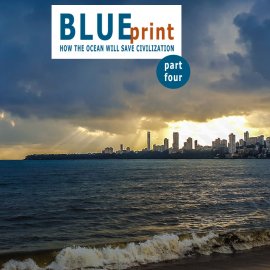Ecology, Ocean and Equity
-
English
-
ListenPause
[intro music] Welcome to World Ocean Radio… I’m Peter Neill, Director of the World Ocean Observatory. Ecology is defined as “the study of the relationships between living organisms, including humans, and their physical environment; it seeks to understand the vital connections between plants and animals and the world around them.” Ocean is defined as “a continuous body of salt water that is contained in enormous basins on the Earth’s surface.” Equity is defined as “the quality of being fair and impartial.” The key elements of the sequence are: relationship, continuity, and fairness. Thus, the sum of an equation of ecology to ocean to equity is the total of inclusion, connection, and justice. The “ocean is important for everyone,” states an International High Level Panel Report on Ocean Equity, “it produces oxygen and food, stores carbon and heat, offers space for economic activities and recreation, and continues to inspire and support culture and well-being.” It is a universal, unified common space that unlike the land, divided by territorial ambitions and dis-integrated natural and political systems, provides democratic, co-equal services for all. It is only when, as the Report continues, “access to ocean resources and sectors” is limited, then “many of the benefits are accumulated by a few, while most harms are borne by the most vulnerable.” The most obvious inequity is property ownership. Over history, land at the confluence of rivers and ocean and alongshore was first the purview of native peoples, soon thereafter displaced by colonization, port activities, and intensifying urban development. Today, port cities are the epicenters of manufacture, trade, finance, and associated population intensity. As trade increases, so does the pressure on original population and location, condensing the poor into ghettos and slums. Mumbai, India, is one such example: corporate and bank towers, apartment buildings, seaside residences, public buildings concentrate to force the port facilities to relocate to more distant industrial areas, leaving a lonely fish market and an enormous slum remaining at the center of what was once a thriving maritime enterprise. The pattern repeats everywhere. The ownership is exclusive and stratified, realized by income level, private and public utility, sometimes religion. Even the public parks reveal the divisions of caste, gentility here, workers there, and the poorest of the poor excluded completely to begging around the edges. Education and access to culture are comparatively differentiated, further expanding the distance between have and have-not, exacerbated by external factors such revolution and war, climate factors, food and water insecurity. The FAO report continues: “The developed countries consume 70 percent of the world's energy, 75 percent of its metals, 85 percent of its wood and 60 percent of its food. In the developing world, the people spend a higher proportion of their small incomes on food than their counterparts in the industrialized countries. Food supplies tend to be unpredictable and nutrition poor. Jobs are scarce. Investment in education, health and sanitation is low. In some developing countries per capita income is falling. Per capita food production fell during the 1980s in at least 58 countries: by 1990, food availability was lower than total calorie needs in more than 40 developing countries.” Therein lies the crisis we face. Consumption of natural resources, food supplies, sanitation, employment: the ocean contributes substantially to all of it, with the vulnerable losing exponentially more as oil and gas by-product pollutes air and water, fish stocks are harvested toward extinction, fresh water supplies are poisoned and depleted, and jobs reduced to lower than menial if there is work at all. But the opposite still remains possible; that is, all these ocean factors are not yet lost to our future, and our focus on reversing these trends to equitable solution remains still possible. I do not accept this as naïve optimism. I believe it is possible without question using technology and finance at hand. More than possible actually – inevitable as the only viable choice. Time and scale matters here. What seems a localized situation is actually a symptom of a worldwide phenomenon, and inherent in the confrontational national agendas and vested interests are the seeds of global collapse. The facts are already evident. And now add viral pandemic to the mix. How long do we have? And what will it take? Time to choose. We will discuss these issues, and more, in future editions of World Ocean Radio. [outro music]
This week on World Ocean Radio: part four of a multi-part series entitled "BLUEprint: How the Ocean Will Save Civilization". In this episode--Ecology, Ocean and Equity--we share findings from the High Level Panel for a Sustainable Ocean Economy and assert that the sum of an equation of ecology to ocean to equity is the total of inclusion, connection, and justice. The BLUEprint series outlines a new and sustainable way forward for civilization, with the ocean leading the way.
Part four of the BLUEprint series, serving to outline a new and sustainable
path forward for civilization, with the ocean leading the way.

About World Ocean Radio
Since 2009, a weekly 5-minute podcast covering a broad spectrum of ocean issues from science and education to advocacy and exemplary projects. World Ocean Radio, a project of the World Ocean Observatory is available for syndicated use at no cost by college and community radio stations worldwide. Contact director@thew2o.net if you are interested in becoming an affiliate or know of a radio station that should be broadcasting these episodes each week.
Image
Mumbai, India
Srinivas JD
Resource from this Episode
- High Level Panel for a Sustainable Ocean Economy Blue Papers
- Login to post comments



